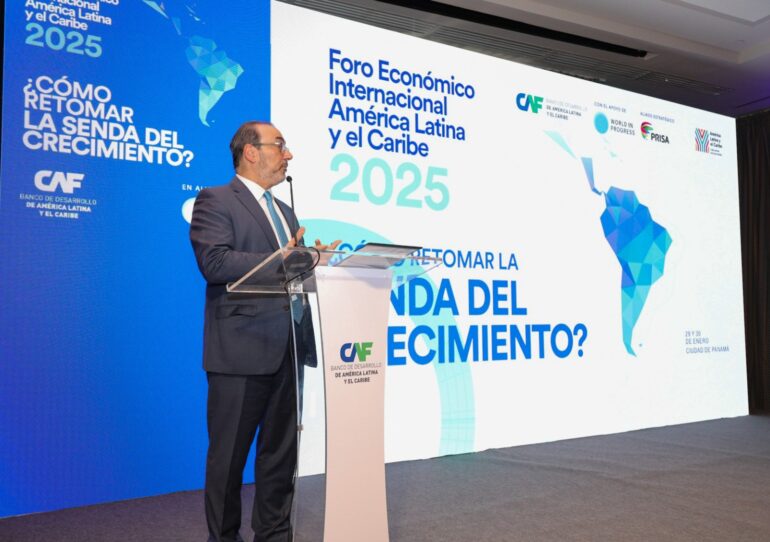The ‘International Economic Forum Latin America and the Caribbean 2025’, organised in Panama by CAF, the PRISA Group and WIP, will feature speakers from 15 countries, including the President of Paraguay, Santiago Peña, two former Prime Ministers of EU countries, and world-class experts such as sociologist and economist Jeremy Rifkin.
CAF -development bank of Latin America and the Caribbean- and Grupo PRISA together with World in Progress (WIP) are organising the event, the full title of which is “International Economic Forum Latin America and the Caribbean 2025: How to get back on the path to growth?”, a high-level event that will take place on January 29 and 30 at the Panama Convention Center and will bring together global and regional leaders to discuss and formulate strategies aimed at promoting sustainable economic growth and improving the well-being of the region’s inhabitants. During this International Economic Forum, new ideas and strategies are expected to emerge.
The International Economic Forum event will discuss issues such as low investment, inequality and the effects of climate change, as well as the key role of the private sector in driving sustainable development and innovation. The main theme addresses how to overcome economic stagnation and take advantage of the region’s competitive advantages.
“Latin America and the Caribbean face enormous challenges, but they also have extraordinary potential to lead in key areas such as the energy transition, food security, creative economies and climate action. This Forum seeks to be a space for leaders from across the region to jointly design innovative and realistic solutions that will allow us to return to the path of growth and build a more prosperous and inclusive future for our people,” said Sergio Díaz-Granados, CAF’s Executive President.
The new International Economic Forum will feature the participation of prominent speakers from 15 countries, including senior officials from Latin American and Caribbean governments, representatives of multilateral organisations, and influential figures from the business sector.
Confirmed participants include:
• Santiago Peña, President of the Republic of Paraguay
• Sergio Díaz-Granados, CEO of CAF
• Joseph Oughourlian, President of Grupo Prisa
• Mateo Renzi, Former Prime Minister of Italy
• Helle Thorning Schmidt, Former First Lady of Denmark
• Jeremy Rifkin, Renowned Sociologist and Economist
• Rebeca Grynspan, Secretary-General of the United Nations Conference on Trade and Development (UNCTAD)
• Laura Richardson, Retired General of the United States Army
• Rachel Adams, Director and Founder of the Global Center of AI Governance
• Carlos Felipe Jaramillo, Vice President of the World Bank for Latin America and the Caribbean
• Andrés Allamand, Ibero-American Secretary-General
• José Manuel Salazar-Xirinachs, Executive Secretary of ECLAC
• Susan Segal, President of the Council of the Americas
• Núria Vilanova, President of CEAPI
• Rebecca Bill Chavez, Director of the Inter-American Dialogue
Latin America and the Caribbean face significant vulnerabilities, such as low economic growth (1.6% average annually since 2010), high inequality, insecurity, and the adverse effects of international conflicts and global crises such as debt and climate change. This backdrop makes the discussions at the International Economic Forum even more essential.
However, it also has great opportunities in sectors such as responsible mining, renewable energy, agribusiness, the creative economy and sustainable tourism, which can become key drivers of development if managed strategically and sustainably.
Event outline for the new International Economic Forum
During the two days of the International Economic Forum, discussion panels, keynote lectures and interactive workshops will be held. The sessions will address priority topics such as:
• Economic situation 2025: Analysis of the economic challenges and opportunities in the region
• Circular economy in the region: Sustainable practices in the management of urban solid waste
• Connectivity for regional development: The role of air, port and logistics connectivity in the green and digital transition
• Entrepreneurship as a driver of development: Impact of entrepreneurship on sustainability
• Energy transition: Exploration of the potential of renewable energies in the region
• Financial inclusion through technology: Digital tools to close social gaps


